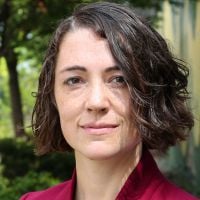Last week, Minnesota engineer and planner Charles Marohn received a letter notifying him of a complaint of misconduct filed against his professional engineering license. Was Mr. Marohn accused of a misstep in his professional engineering practices? No. Rather, the complaint concerned Marohn’s writings on his website, Strong Towns.
I’ve talked here before about the rights (and the responsibility) of scientists’ engaging in the public dialogue around science-based decisions. Whether or not you agree, I think none of us would expect to have our professional credentials questioned simply for speaking out for reform in the area we work.
Attacks on an engineer’s credentials for simply advocating change

Minnesota engineer and planner Charles Marohn was notified that a complaint had been filed against his engineering license for misconduct. The board determined no violation had occurred, but attacks like these have a chilling effect on experts. Photo: Courtesy of Charles Marohn
Marohn started a blog in 2008 that evolved to a nonprofit called Strong Towns. Marohn and the group raise issues and discuss solutions to why American cities and towns are going broke. Utilizing their engineering and city planning expertise, they work to address what they see as unsustainable development patterns in the U.S. that damage the safety and wealth of communities. Instead, they argue, we should re-think the way we fund and build urban infrastructure to be more safe and productive for all. (As a side note, UCS also supports smart growth policies as a way to save oil).
As Marohn points out, this isn’t the first time they’ve faced criticism from others in their field who see their position as undermining the philosophical and financial goals of the industry. Specifically, their position is inconvenient for those looking to maintain the status quo of current funding structures, namely unlimited funds for motor vehicle travel. Attacking Marohn’s credentials, however, takes such criticisms to new levels.
A chilling effect
Fellow engineer and critic of Marohn’s, Jeffery Peltola decided to attack Marohn’s credentials as an expert, accusing him of misconduct and filing an official complaint with the Minnesota licensing board. Though the board rightfully found that no violation had occurred, the incidence is telling of the challenges that many technical experts face when their professional opinions have policy implications.
Such moves can have a chilling effect on scientists’ willingness to speak out. Many experts aren’t accustomed to the spotlight and such public questioning of their credentials can be intimidating and many cases that is the precise motivation behind the accuser. Marohn states, “I’m not going to let this intimidation change what I do. It has strengthened my resolve to stand up,” but others may not be as resilient.
While there is more focus on harassment of climate scientists, it is worth reiterating that technical experts in many fields have faced similar attacks—from biologists studying frogs to medical researchers studying marijuana. To help, UCS developed a guide and pushes back against attacks, to help experts navigate such public scrutiny of their work.
Charles Marohn told me he felt he couldn’t practice engineering while speaking out. “I felt like I had to choose between being an advocate and being an engineer,” he explained.
A need for scientific experts in public policy debates
This chilling effect is problematic for science and for us all. Importantly, scientists don’t give up their first amendment rights at the lab room door. They have a right to speak up and participate in the democratic process. There of course should be rules guiding professional behavior, but such rules by and large shouldn’t cover what scientists do on their personal time.
We need technical experts like Marohn to speak up when their scientific work suggests a need for policy changes. Engineers, scientists, and other experts are often in the unique position of being able to identify inefficiencies, errors, and shortcomings with our public policies around scientific issues. If those policy decisions could be improved by being better informed by science, I for one want experts like Marohn to speak up. This is how we get better policy outcomes that improve our health, safety, and wellbeing—in the design of our cities and towns as well as a host of other issues.
Our scientists and engineers shouldn’t be the only people making public-policy decisions on science-based issues, but they, without a doubt, need a seat at the table.
